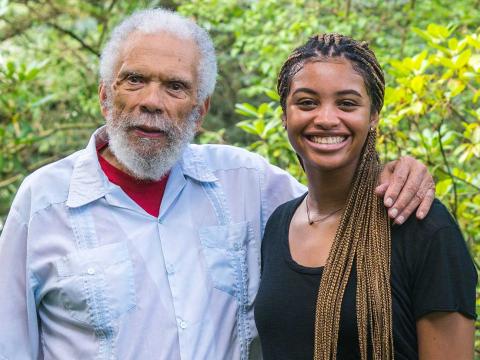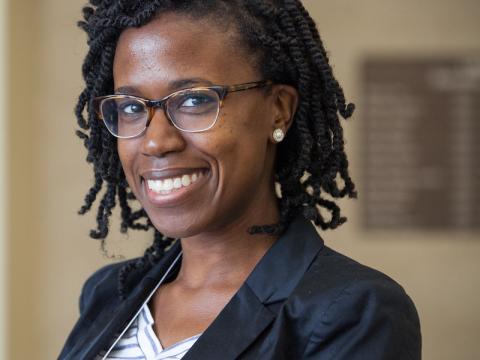
Anthropology Major and Minor
Anthropology majors and minors study human societies. As a department, we explore socio-cultural anthropology. Our emphasis—distinct from an historical or a biological approach to anthropology—puts social and cultural institutions such as family, politics, rituals, religion and expressive culture center stage.
We are driven by the belief that the discipline has great power to address the most pressing issues of our time.
Curriculum & Courses
Through a broad range of classes and co-curricular opportunities, our students develop a deep understanding of the discipline of anthropology—the theories that have shaped it, the range of subfields it possesses, and the unique contributions and relevancy of the field. They also cultivate the tools to conduct ethnographic research and collect data with rigor and respect.
Our required curriculum for majors spans from introductory classes to advanced independent work. Beginning with Introduction to Anthropology taken in the first or second year, students progress through classes at the 200- and 300-level. Our required History and Theory of Anthropology course explores the development of anthropological thought. We also require majors to explore a particular ethnographic area—such as Africa or China—through a 200-level class. For majors, the academic experience culminates in their senior year with the development and writing of a senior thesis. Students in the major build a rich course of study drawing on our wide range of classes, involved student community, and faculty known for their scholarship as well as their mentorship and engagement in contemporary issues.
Our required curriculum for minors begins with Introduction to Anthropology taken in the first or second year. Minors also take History and Theory of Anthropology, one 200-level class that explores a particular ethnographic area (such as Africa or China, and three other courses at the 200- or 300-level. Students in the minor build a rich course of study drawing on our wide range of classes, involved student community, and faculty known for their scholarship as well as their mentorship and engagement in contemporary issues.
-
Major Requirements
Students are required to take a total of 11 courses in the major, including 6 required courses within the department. Individual programs require the advisor’s approval.
- ANTH H103, Introduction to Anthropology, preferably in the first or second year.
- ANTH H303, History and Theory of Anthropology, before the senior year.
- One course focused on an ethnographic or geographic area or a cohesive non-geographically specific field.
- One other 200-level course in this department.
- One other 300-level course in this department.
- Four additional courses approved by your major advisor.
- A two-credit, intensive Senior Thesis Seminar, during the fall and spring semesters of the senior year (ANTH H450 and ANTH H451).
All major programs require the approval of the major advisor. Students may count no more than one biological anthropology or archaeology course for the Haverford major. Students must take the remaining courses in the Haverford Anthropology Department, in an anthropology department within the Tri-Co or at Penn. Taking courses to count toward the major outside of Haverford’s Anthropology Department, outside of the discipline, or while studying abroad requires approval of the student’s advisor. Typically no more than two courses from outside of Tri-Co anthropology that relate to the student’s specific interests are counted towards the major though this can be discussed with the advisor in special cases.
Senior Project
The anthropology thesis is a year-long, two-credit independent research project designed and implemented by each senior anthropology major. Each student selects a research topic, defines a specific research question, describes how that question relates to a broader field of ethnographic and anthropological writing on the topic, conducts independent, original research with primary source materials that can be ethnographic, archival, and/or material, and develops and writes up an original argument, supported by evidence, about the primary source materials. This argument is informed by the relevant theory and by ethnographic and anthropological scholarship. Thus, a successful anthropology thesis will provide substantial evidence that students are able to conduct independent research and synthesize theoretical arguments with ethnographic materials, as well as displaying strong skills in presenting their research, and entering into intellectual dialogue with peers and faculty.
The senior thesis consists of two courses, ANTH H450 and ANTH H451. Anthropology 450 is a seminar course taught during the fall semester, typically by one faculty member who receives one teaching credit. For ANTH H450, students define their research question, write and rewrite a research prospectus, do ethnographic exercises, study professional ethics, familiarize themselves with IRBs, and conclude with a literature review of their topic. ANTH H451 is supervised research and writing. A faculty member receives one credit for supervising four to six senior theses. During ANTH H450, each student does guided research on their topic, drafts and writes a thesis, and does a public presentation of their thesis research, and takes an oral comprehensive exam.
Senior Project Learning Goals
- Define an anthropological research question.
- Situate their research question in a broader field of anthropological and scholarly inquiry.
- Conduct research with primary source materials (archival, ethnographic, and/or material).
- Develop an original argument about their primary source materials that is informed by relevant theory and anthropological literature.
Senior Project Assessment
For ANTH H450, students are assessed on a preliminary research proposal, a research prospectus, a literature review draft, a research presentation, and a literature review, as well as short in-class methodological exercises. For ANTH H451, students are assessed on their final thesis, public presentation, and oral exam. Two faculty members read and comment on each thesis. All faculty attend and evaluate the public presentations and the oral exams. The faculty collectively assign each student’s final grade for the course, as well as each of the three components (thesis, public presentation, and oral exam). The thesis also plays an important role in whether or not a student receives honors or highest honors in Anthropology.
Requirements for Honors
The faculty in the Department of Anthropology decides honors based upon overall excellence in the major:
- Outstanding work in the senior thesis (final written work and oral presentation).
- Strong cumulative performance in all anthropological coursework (typically a grade point average of 3.7 or higher).
- A record of consistent intellectual commitment and participation in the department.
Faculty awards high honors upon occasion, for exceptional contributions in all three areas.
-
Minor Requirements
The minor in anthropology consists of six courses, including:
- ANTH H103, Introduction to Anthropology
- ANTH H303, History and Theory of Anthropology
- An ethnographic area course
- Three other courses at the 200 or 300 level, including one course at the 300 level.
Minors must take a minimum of three courses in the Haverford department. All minor programs require approval of the minor advisor.
Research & Outreach
In their senior year, majors produce a senior thesis, a work of original research. Students select a research topic, define a research question, and conduct and write up their original research. Two courses, each a semester long, are a key part of the process. In Anthropology 450, a seminar taken in the first semester of senior year, majors produce a research prospectus. During the spring semester, they enroll in Anthropology 451, working one-on-one with a faculty member to complete and draft their theses. At the end of the year, students meet with the full faculty to present their work and take an oral comprehensive exam.

The anthropology and linguistics double major compared and analyzed how diasporic and homeland communities express and convey their identities.

The anthropology and French double major’s two theses explore unlikely sites of queer solidarity.

The anthropology major is giving a voice to unheard histories as an intern for the BlackQuakerProject.

The thesis of the anthropology major, who minored in health studies and concentrated in gender and sexuality studies, was fueled by a desire to expand the discipline into digital field sites and to expand trans academia.
After Graduation

Supported by $40,000 from the Watson Foundation, Emma Schwartz ’24 will embark on global travels to explore issues of abolition.

After nearly five years as the chief financial officer to Philadelphia’s City Council, for which he helped analyze and plan multibillion-dollar budgets, Matthew Stitt was not finished with his hometown. Now he counsels public sector clients on how to change budgets and institutions in equal service of all residents.

The anthropology major and education studies minor is in her first quarter at Stanford University’s Graduate School of Education, where she is pursuing a Ph.D. in education.

Warnke specializes in corporate social responsibility and nonprofit branding, portfolio, and capability growth.

“If I could do it all again, I would still major in Anthropology!” exclaims Misha Baker ’10. She currently lives in Atlanta, Ga. and works as a Graduate Research Assistant at theCenters for Disease Control and Prevention (CDC), a dream opportunity for those interested in public health and public policy.

The Anthropology major and Latin American, Iberian and Latino Studies concentrator works as a nationally certified sign language interpreter.
Keep Exploring
More Programs
Check out our other academic offerings:
Get in Touch
Join the Mailing List or search for events in your area.
You can find detailed instructions and information on the Application Instructions page. If you need to contact us directly, please send an email to admission@haverford.edu.
Get Social with Haverford